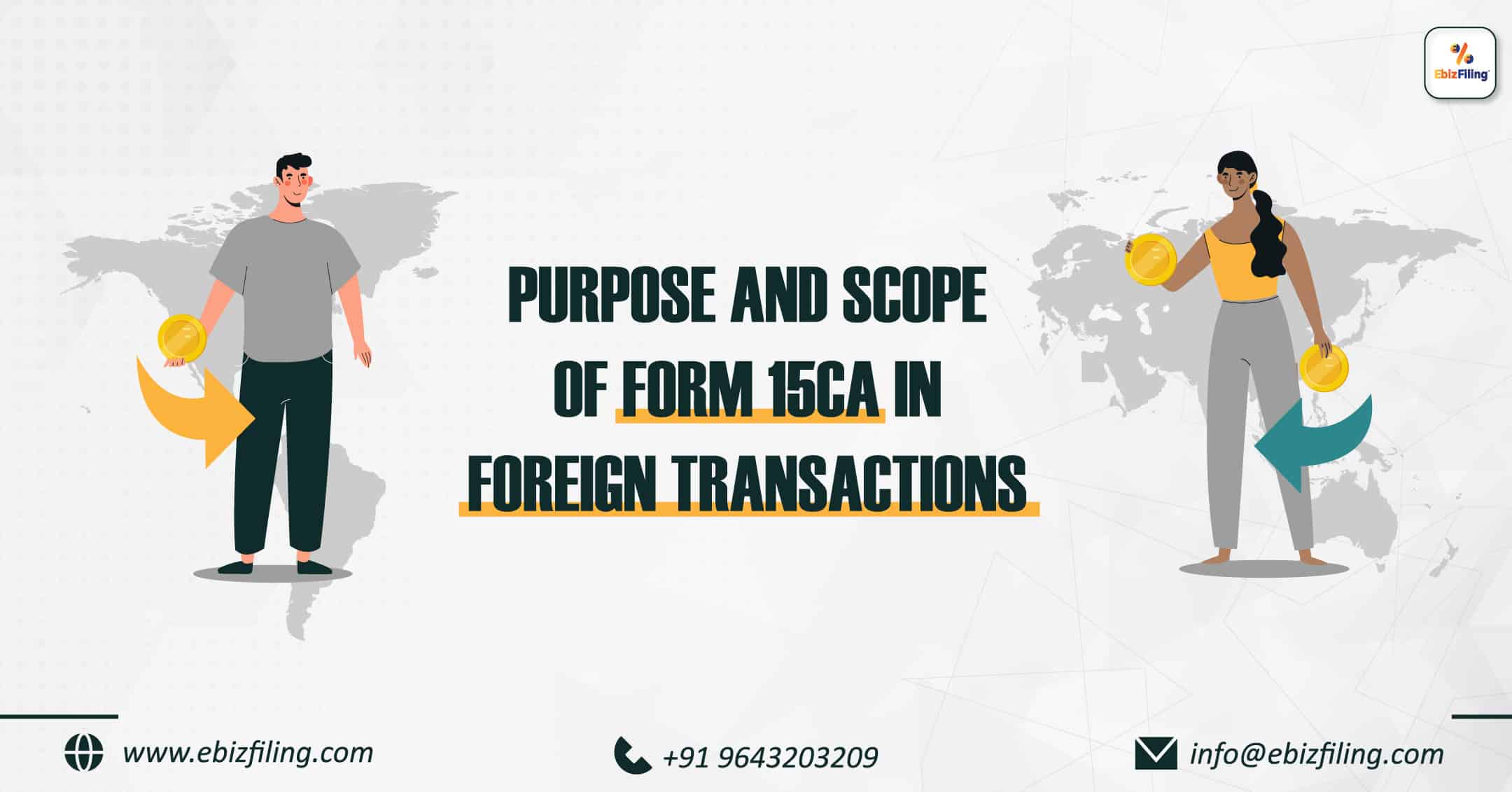
-
October 19, 2023
What is the purpose and scope of Form 15CA in Foreign Exchange Transactions?
Table of Content
Introduction
Foreign exchange transactions are an integral part of the global economy. With the rise of globalization, businesses and individuals are increasingly engaging in cross-border transactions. However, such transactions are subject to various regulations and compliances, including the submission of Form 15CA and Form 15CB for foreign remittances with countries in DTAA agreement. In this article, we will discuss the purpose and scope of Form 15CA in foreign exchange transactions.
What are Foreign Exchange Transactions?
Foreign exchange transactions involve the conversion of one currency into another for various purposes such as trade payments, investments, or remittances. These transactions are governed by regulations set by the respective countries’ central banks or monetary authorities. The purpose of these regulations is to monitor and regulate the flow of funds across borders, ensuring transparency and compliance with tax laws.
What is the Significance of Form 15CA?
Form 15CA is an important document required by the Indian Income Tax Department for any individual or business making a remittance to a non-resident or foreign entity. It serves as a declaration of the remitter’s responsibility to deduct tax at the source, as per the provisions of the Income Tax Act, 1961.
What is the purpose of Form 15CA?
The primary purpose of Form 15CA is to gather information about the remittance being made and to ensure that appropriate taxes are deducted before the funds are transferred outside the country. This form acts as a means for the Indian government to track foreign remittances, prevent tax evasion, and enforce compliance with the provisions of the Income Tax Act.
What is the scope of Form 15CA?
Form 15CA covers a wide range of foreign remittance transactions, including but not limited to:
-
Payments for the acquisition of foreign assets: When an individual or business purchases a foreign asset, such as shares, property, or investments, and remits funds abroad, Form 15CA needs to be submitted to report the transaction.
-
Business payments to non-residents: If a business makes payments to a non-resident, such as consultancy fees, technical services, or royalty, exceeding a specified threshold, Form 15CA is required to be furnished.
-
Travel and education-related remittances: Individuals making payments for travel-related expenses, such as booking hotels, flights, or foreign education fees, are also required to submit Form 15CA.
-
Gifts and donations to non-residents: Any gifts or donations made to non-residents above a certain threshold also fall within the scope of Form 15CA.
What are DTAA Agreement and Form 15CA?
The Double Taxation Avoidance Agreement (DTAA) is a bilateral agreement entered into between countries to eliminate the double taxation of income earned in one country by residents of the other. The provisions of the DTAA can impact the requirement of submitting Form 15CA.
In cases where the DTAA agreement is applicable, individuals or businesses may be eligible for lower or zero withholding tax rates, provided they obtain a Tax Residency Certificate (TRC) from the foreign country. This TRC, along with the relevant sections of the DTAA agreement, needs to be furnished while submitting Form 15CA.
Conclusion
In conclusion, Form 15CA is an essential compliance requirement for foreign remittances. It ensures that the remittance is in compliance with the provisions of FEMA and the Income Tax Act, 1961. The scope of Form 15CA is vast, and it is required to be furnished for all foreign remittances, except those that are exempted under Rule 37BB. The Double Taxation Avoidance Agreement with various countries also plays a crucial role in determining the applicability of Form 15CA and Form 15CB. It is essential to comply with the regulations and file the necessary forms to avoid any penalties or legal consequences.
File your Form 15CA
Form 15 CA Online filing is necessary if you are making payments outside India to an Individual NRI or a Foreign Company.
About Ebizfiling -





Reviews
Akshay Sharma
18 Apr 2022I took a TM service for my Tea Brand, wonderful service with humble staff, and provided solutions on time. Recommended for all
Ashish Paliwal
29 Sep 2018Let me be honest and tell you that I did not choose eBiz filing after my initial LLP company registration did to pricing. A lot of companies contact me with better rates so I generally choose them. However, I will still rate eBiz filing 10/10 on work ethics. You guys are professionals in true sense.
John Mello
13 Mar 2018I am associated with Ebizfiling since a year now. And all my IT returns and GST returns are managed successfully by them. Really happy with the services.
April 22, 2024 By Team Ebizfiling
MSME Registration Fees: Recognizing the Relevant Charges Registration with the relevant authorities is necessary to receive the benefits and incentives offered to MSMEs. Entrepreneurs, however, frequently want clarification on MSME registration fees. The intricacies of MSME registration charges are explored […]
April 19, 2024 By Team Ebizfiling
Frequently Asked Questions (FAQs): A Guide to Understanding Form 15CA and Form 15CB The Indian Income Tax Department requires Forms 15CA and 15CB to facilitate overseas transactions and guarantee that tax requirements are followed. Remittances from Indian citizens to non-residents […]
April 15, 2024 By Team Ebizfiling
Comprehending Taxation and Compliance for Transport Business Startup Understanding taxation and compliance is not just necessary, but crucial for entrepreneurs considering launching a transportation business. Before you understand how to start a travel business in India, you should read the […]